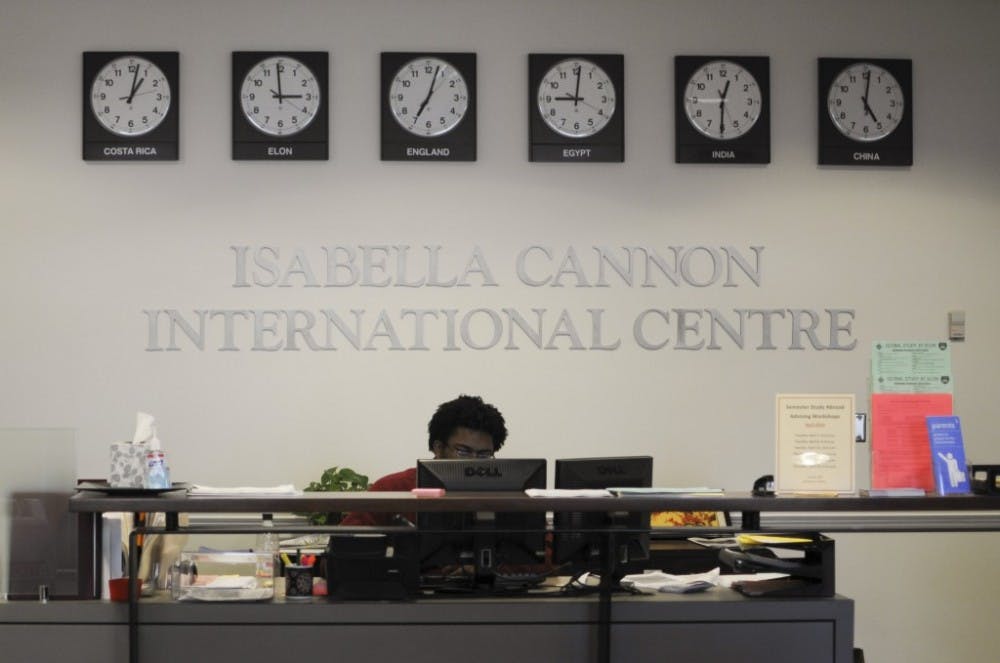Elon University prides itself on its study abroad program. According to university statistics, nearly 72 percent of the class of 2012 studied abroad, and this percentage is expected to rise as more study abroad opportunities become available to students.
Many students who choose to go abroad for a semester are surprised by the differences between their universities abroad and Elon. Emma Burress, assistant director of study abroad at the Isabella Cannon Global Education Center, said both the contrasts among schools and students’ surprise are common.
“There are big differences between the university experience here and in other countries,” Burress, who grew up in South Africa and attended the University of Cape Town, said. “The university experience is much broader here.”
The broader university experience enjoyed in the United States encompasses all areas of student life, from academics to athletics, but universities in other countries hold their own against their American counterparts.
“There is a much greater reliance on independent study in other countries,” Burress said. “This makes students independent and gives them a different way of thinking.”
Janelle Papay, international programs adviser at the Global Education Center, agreed.
“It’s knowing versus memorizing and regurgitating information for a test,” she said.
Burress also emphasized students’ reliance on university services.
“Students rely very heavily on student services here. They expect to be told what will be in exams. They have more support. They don’t have the opportunity to expand their way of thinking as much,” she said.
According to Burress and Papay, American university students receive far more guidance and support than students in other countries.
“There are less allowances in other countries,” Burress said. “There are no separate services. I was never allowed to take an exam on a different day or anything like that. Disability services are more comprehensive here. People are more involved in American educations.”
Paying for what you get
In other countries, the majority of students handle their own finances, Papay said. Students pay for their own educations, food, books, rent and any other expenses. American students have a difficult time gaining that same independence because of universities’ high costs.According to the College Board, the average cost of tuition and fees for the 2013-2014 school year for state residents attending a public college was $8,893. This cost is higher for students attending private colleges or out-of-state students attending public colleges.
In Europe, tuition costs vary from country to country. Many countries, such as Germany and Sweden, offer free education at public universities. Others, such as France, cost anywhere between 150 and 700 euro per year.
“There is no tuition in Sweden,” said freshman Izzy Agostini, a native of Lidingo, Sweden. “And I get a grant to study here.”
Costs seem much higher when they are paid all at once, as they are in the U.S., but in other countries, people spend their whole lives paying for their educations through taxes.
“You’re paying directly, through tuition, or indirectly, through taxes,” Burress said of the differences in cost.
The financial obligation students bear to attend American universities engages parents.
“Parents are much more invested in their children’s university experiences,” Burress said. This can prevent students from gaining the same level of independence as their European peers.
As far as costs go, “You pay for what you get,” Papay said.
Universities in the U.S. offer more services and facilities than their international counterparts, and students pay for those services with higher tuition and fees.
“There is an expectation in this country that universities have all these buildings and services,” Burress said. “In Europe, that’s not an expectation of the students.”
The services American students expect — dining halls, recreational facilities, residence halls, student centers and athletic stadiums, to name a few — come with a price.
“A lot of money goes to things that are not directly associated with education,” Burress said. “It’s an industry of tertiary education.” The services offered by American universities attract students, American or otherwise. “A lot of Europeans are attracted to university in America,” Agostini said.
In loco parentis
In other countries, when parents send their children off to university, they’re considered adults, Burress said.“Students live at home and manage their own lives. Here, university is a very protected environment in which to bend rules,” she said.
Papay said it’s almost as though the law doesn’t exist in American universities.
“When you attend a private school, you sign a contract to abide by campus policies. If you’re underage and you’ve been drinking and you’re caught by campus police, you don’t get in serious trouble. You get a slap on the wrist,” she said.
In Europe, there’s no protection.
“If you break the law, you break the law,” Papay said. “In the U.S., every facet is controlled, facilitated. It’s ‘in loco parentis’: ‘We are your parents while you’re here.’”
Papay praised the American University System’s ability to prepare students for their future careers.
“We’re more concerned about fulfillment with career here,” she said. “There are more resources here, more training for jobs.”
Burress agreed and said there is less access to practical, hands-on education in other countries.
“The American University System is not wrong or bad,” she said. “It’s just very different from other countries, and it produces different types of people.”


